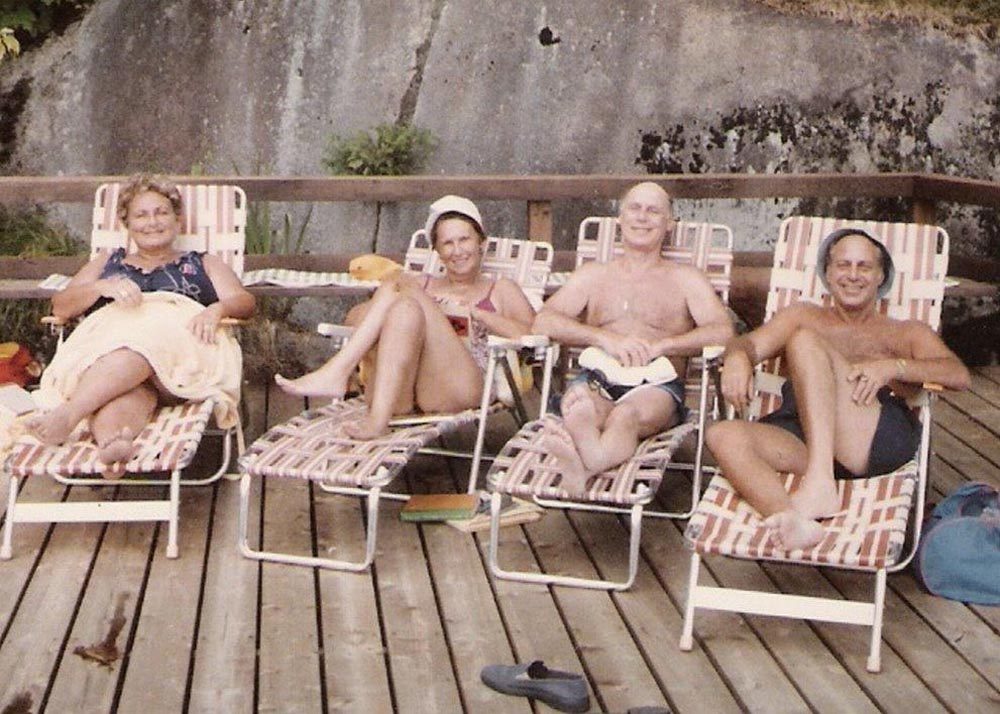Advertisement
COMMENTARY
Lessons For An Anxious Time: Parching Despair Before It Takes Root
Resume
The picture is from the summer of 1976. My parents, my Uncle Herbie and my Auntie Anne are in their bathing suits, arrayed on deck chairs, smiling into the camera. More likely, they are beaming at the scene that lies behind the photographer — the large, rugged contours of Quebec’s Lac Archambault, the small island within swimming distance of the dock where a pine tree juts out over its rocky face like a jaunty hat.
Then in his early 50s, Herbie, my father’s brother, was the oldest of the quartet. My mother, at 47, was the youngest. Today, she is the lone survivor.
But then, my God, you can’t imagine four people more full of life. The intensive parenting years are behind them; my cousins, brother and I are by then all in college or have launched from it. They are all employed, but not consumed by their work. The best of friends, they are together in the spot on this planet that nourishes them most with its evasive sun, temperamental water, rounded green mountains and haunting family of loons that glide across the lake every evening at dusk.
Today, on a deck chair behind the gym tucked between a condo complex and a body shop, I think mournfully of that picture. The house in Quebec has long since been sold. None of the five of us cousins live in the same city. Some of our children know each other more through Facebook than through live encounters.
Sitting alone, scrolling through the news on my phone on this melancholy morning, I’m bombarded by reports on crumbling glaciers and rising seas, increasing temperatures and climate refugees, false and incendiary tweets about nuclear weapons, fire and fury, videos of Nazis and white nationalists parading through the streets of Charlottesville.
I miss those people in the picture. And I want to be them — fearlessly soaking up the sun, surrounded by family, embracing the day with unmoderated joy.
But of course I’m idealizing the past. My father and uncle had grown up during the Depression, moving from one apartment to the next, and in each, anxiety permeated the home as much as the smell of chicken fat. Anne had started her life in Vienna, and when she left that city as a young teenager, it was on one of the last Kindertransport trains, with her mother and father and all the other doomed parents left behind on the platform waving heartsick goodbyes.
Jew will not replace me, the Unite the Right demonstrators chanted in Charlottesville. I see them in a tiny window on my phone.
Our parents had no Twitter, but they were just as scared and appalled by the lunatic rantings of a powerful leader spewing out of their radios. Their wars were not fought in remote lands and shown to the public only in censored, sanitized pictures. Herbie had been an Air Force radio operator in England, where he met Anne. My father had served in the Canadian army, and though my mother only knitted lumpy scarves for the soldiers, she was no different from the other three in her knowledge of people who went away and didn’t come back, or came back changed, and not for the better. They hadn’t known nuclear weapons existed, but then saw them used.
Somehow they mastered the feeling of helplessness that is so new to me and so corrosive in this strange new/old world.
By the time the cheery summer picture was taken, the four of them had already been orphaned -- to concentration camps, to cancer and heart disease and Alzheimer’s. They’d lost jobs, faced bankruptcies, started anew over and over again. During the Cuban Missile Crisis, they’d stockpiled food and whisked us kids out of the city. They’d worried about our safety, about our poor judgment and bad choices and still, always loved us unconditionally. They’d taught us the hatred of racism and war that my generation would claim as uniquely ours.
Despite their tanned, relaxed bodies, despite their barefooted comfort on that dock on that day, their lives were not perpetually sunny. They’d lived through the cataclysms that so frighten me now, and handled them with no more or less grace than anyone else. Now older than they were in that picture, I know all the pain and worry that seethed and tumbled with all the joy inside them.
But they knew something I haven’t yet grasped. Somehow they mastered the feeling of helplessness that is so new to me and so corrosive in this strange new/old world.
Having grown up in hardship, did they have a stronger sense of their own agency? Having weathered enough calamities — both routine and extraordinary — had they lost their fear?
Neither, I think. Those four parents simply loved life’s essentials — food, water, sun and a herd to huddle with — with a blazing fierceness that parched despair before it could take root.
Studying their picture like it’s the Torah, like it’s the cure to all diseases, like it’s my child’s face, I wonder: Can I learn to love like that?

